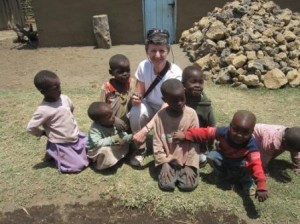
The children were excited to see a white person in their village! They all wanted to hold my hand.
If you were growing up in Tanzania instead of the United States, your life would be VERY different. Some people live in a big city, but many live in small towns or even smaller villages. Most families live without the many things we have in our American homes, that we just take for granted – electricity and plumbing for example, or furniture and toys.

The children were excited to see a white person in their village! They all wanted to hold my hand.
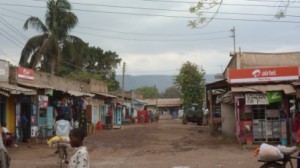
A typical town in Tanzania.
We drove through several towns that looked like the one in my photo. Most families don't own a car. Most people get around by walking. Some men ride bicycles.

A typical town in Tanzania.
One day we visited the little village of Ilkidinga. We were told that it was a typical village in Tanzania. 
These houses were made of straw.
Each family had a small house. Several families grouped together, owning a plot of land where they could grow their crops, like bananas, coffee, and corn. They keep some for themselves, but most are sold to earn money for the family.

These houses were made of straw.
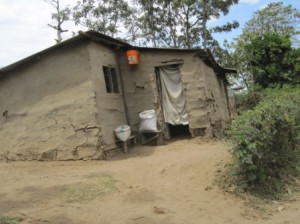
A typical house in Ilikidinga Village.
Many houses are made out of sticks and cow dung. The sticks were put close together. Then the cow dung was spread over it to fill in the cracks. Once it dries, it doesn't smell bad at all. Since cows eat only grass, it just has a bit of a grassy smell. It keeps the rain out of the house and the heat inside.

A typical house in Ilikidinga Village.
There is no electricity in these houses, and no furniture. Pieces of cloth are hung as doors. There is also no plumbing. That means no water faucets, no shower, no toilet. Buckets of water are gathered from a stream, a well, or from a water pipe in town if there is one. People in the village share a pit toilet.
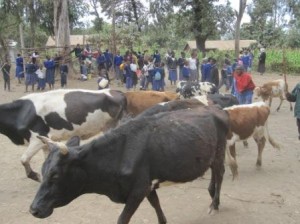
A man herds his cattle past the front of Ilkidinga School.
The families have many children. There are not enough schools and not enough teachers, so the classrooms are very crowded. Some classes have over one hundred children in them!

A man herds his cattle past the front of Ilkidinga School.
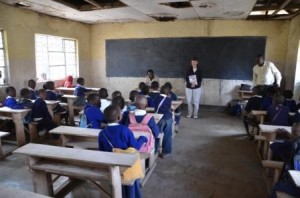
I read Click Clack Moo to the schoolchildren.
The day I visited, I read Click, Clack, Moo to some of the children. They were fascinated! They were not used to having someone read to them. Their school does not have books. Since their first language is Swahili, the teacher translated the story for them. I would read a few sentences in English, and then wait while the teacher said it in Swahili.

I read Click Clack Moo to the schoolchildren.
What do you notice about their classroom?

We often saw boys herding the family's cattle.
Although all children are supposed to go to school, not everyone does. Sometimes parents allow only some of their children to attend school. The others are needed at home to do chores, like gather water, or herd the cows. These children will grow up to have a life similar to their parents. Without education, they can do nothing else. Do you think this is a good idea or a bad idea?

We often saw boys herding the family's cattle.
Children listen to me read Click, Clack, Moo.

Children listen at the classroom windows to hear the story.

Children listen at the classroom windows to hear the story.

The students of Ilkidinga School were very interested in the story.

The students of Ilkidinga School were very interested in the story.
You can click here to see videos about Tanzania made by one of the high schools with the help of an aid organization.
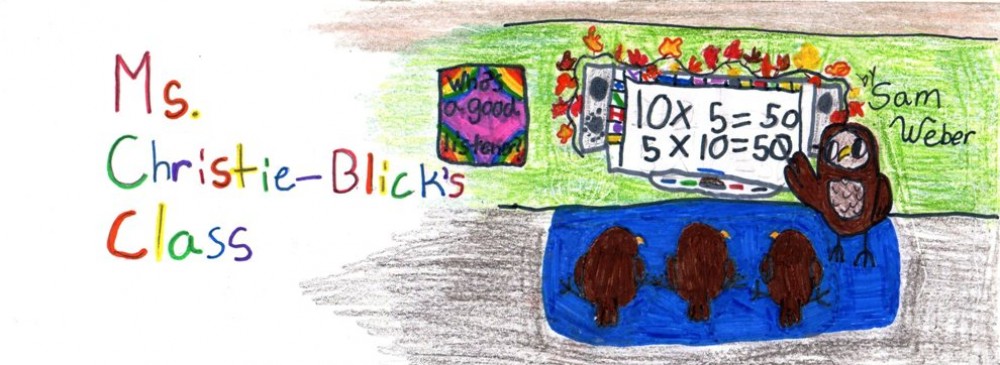
awww!! thats soo sad , i fell bad when people go to thoes places and film i front of there face and not help them 🙁
awww!! thats soo sad , i fell bad when people go to thoes places and film i front of there face and not help them 🙁
Hi Ms. Christie Blick. I thought it was very nice of you to read to those swahili childeren in their school.
Hi Ms. Christie Blick. I thought it was very nice of you to read to those swahili childeren in their school.
Why is their celing broken?
The town of Ilkidinga is very poor. The people do not have money to fix up their school. The government of Tanzania does not have enough money to fix up all the schools either because governments get their money from the taxes people pay. If people do not have jobs and are too poor to pay taxes, then schools, roads, health care centers, and other social services do not get money.
Why is their celing broken?
The town of Ilkidinga is very poor. The people do not have money to fix up their school. The government of Tanzania does not have enough money to fix up all the schools either because governments get their money from the taxes people pay. If people do not have jobs and are too poor to pay taxes, then schools, roads, health care centers, and other social services do not get money.
Do they walk to school every day?
Yes, the kids and teachers walk to school. Their families do not own cars. There are no school buses. It does not snow here because Tanzania is closer to the equator than New York, so they don’t have to trudge through snow. If it rains very hard, school is probably closed for the day because it would be too difficult for the children to walk to school, and the classrooms would probably have water flowing in through the ceiling.
Do they walk to school every day?
Yes, the kids and teachers walk to school. Their families do not own cars. There are no school buses. It does not snow here because Tanzania is closer to the equator than New York, so they don’t have to trudge through snow. If it rains very hard, school is probably closed for the day because it would be too difficult for the children to walk to school, and the classrooms would probably have water flowing in through the ceiling.
Is this classroom big?
It is smaller than a classroom at Cottage Lane.
Is this classroom big?
It is smaller than a classroom at Cottage Lane.
Do the people have electricity in there classroom?
I don’t know about all of the schools throughout Tanzania, but this school did not have electricity.
Do the people have electricity in there classroom?
I don’t know about all of the schools throughout Tanzania, but this school did not have electricity.
I think so nice that you read a book to them. Do thosoe kids in the window go to school?
Thanks Zoe. It was a really interesting experience for me. I was at the school during their recess time. When I told the teacher I had a story to read to the children, he asked a group of children at play if they would like to come inside to hear a story. Kids streamed in. When other kids realized they were missing out, they wanted to hear the story too, but the teacher said they couldn’t come in the room. Maybe he was concerned that it would be too disruptive. They found a way to hear the story anyway – listening at the window!
I think so nice that you read a book to them. Do thosoe kids in the window go to school?
Thanks Zoe. It was a really interesting experience for me. I was at the school during their recess time. When I told the teacher I had a story to read to the children, he asked a group of children at play if they would like to come inside to hear a story. Kids streamed in. When other kids realized they were missing out, they wanted to hear the story too, but the teacher said they couldn’t come in the room. Maybe he was concerned that it would be too disruptive. They found a way to hear the story anyway – listening at the window!
They also have diffrent houses then we do.
They also have diffrent houses then we do.
I also notice that they dont have any electricty stuff.
You’re right, Mackenzie! Take a look at the ceiling. You can tell there are no electrical wires going through there. They have no lights in their school. The windows helped, but the room was darker than what we’re used to at Cottage Lane.
I also notice that they dont have any electricty stuff.
You’re right, Mackenzie! Take a look at the ceiling. You can tell there are no electrical wires going through there. They have no lights in their school. The windows helped, but the room was darker than what we’re used to at Cottage Lane.
Wow! Look at those really cool animals! Ms. Christie-Blick you are so lucky!
Wow! Look at those really cool animals! Ms. Christie-Blick you are so lucky!
There classroom they sit on benches and they wear uniforms.
Good observation, Mackenzie. What else do you notice?
There classroom they sit on benches and they wear uniforms.
Good observation, Mackenzie. What else do you notice?